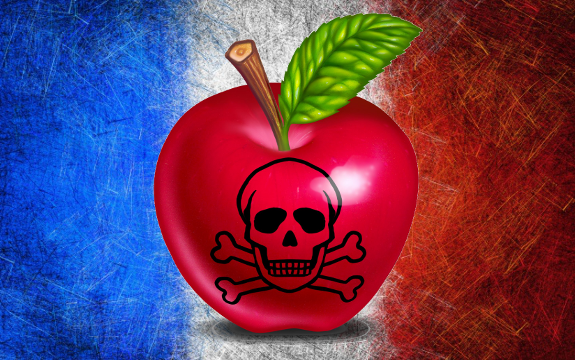French Gov’t Insists EU Raise Awareness About Toxic Chemicals in Foods

 Endocrine disruptors –chemicals that cause our normal hormonal functions to work improperly – are in a host of foods produced by numerous corporations. Now, experts from the French government are putting pressure on the European Union (EU) to define the list of growing chemicals in those foods, and to raise awareness about the serious detriment they pose to people’s health. Looks like GMOs aren’t the only poisons being rejected by France.
Endocrine disruptors –chemicals that cause our normal hormonal functions to work improperly – are in a host of foods produced by numerous corporations. Now, experts from the French government are putting pressure on the European Union (EU) to define the list of growing chemicals in those foods, and to raise awareness about the serious detriment they pose to people’s health. Looks like GMOs aren’t the only poisons being rejected by France.
Endocrine disrupters are seldom talked about in mainstream media articles on health. Our own government, via the EPA, gives a one page explanation of what they are, but they don’t list the hundreds of known chemicals that:
- Impede the organs and glands that are responsible for regulating hormonal flow.
- Cause a breakdown between the pituitary and thyroid, for example, or the adrenals and the reproductive system.
- Stop the thyroid from making important hormones that prevent cancer or obesity, or regulate other important functions of the body.
- Cause women to have hysterectomies unnecessarily due to hormonal imbalances.
Nowhere on the EPA’s information page about endocrine disruptors does it talk about the following abbreviated list of some of the most commonly used endocrine-disrupting chemicals:
- BPA (Bisphenol-A) – This chemical mimics the body’s own estrogen. It is so prevalent that it has been found on 98% of the dollar bills in circulation in the US. It causes breast cancer, feminizes boys, interrupts fertility cycles, and increases diabetes risk.
- Perchlorate – Sadly, this chemical is used in rocket fuel, and it is even found in organic produce. As Anthony Gucciardi has pointed out, perchlorate is “used by military defense contractors, aerospace programs, and various other military operations. Perchlorate has contaminated its way into drinking water, feed, edible plants, animal products, milk and breast milk, and both conventional and organic produce. It is so abundant in the food chain, in fact, that it has been found in virtually all humans tested.
- Arsenic – Also known as rat poison, you can find this chemical in chicken you purchase from your grocery store due to the use of antibiotics. It is a significant endocrine disruptor.
- Dioxin – This is a whole family of chemicals that disrupt normal hormonal homeostasis, but the most toxic are 2,3,7,8-tetrachlorodibenzo-p-
dioxin, or, TCDD.
- Lead – This is a serious endocrine disruptor which can be found in surprising places, such as playgrounds.
- Phthalates – These chemicals come from plastic manufacturers which rely on a petroleum instead of natural sources like hemp to make plastics harder. Hemp plastics are much stronger and do not cause harm to the environment or human health, but the industry continues to churn them out.
- Mercury – Thimerosal is a chemical containing mercury that is often used in vaccines. It is very detrimental to human health.
- PFCs (Perfluorooctanoic acid chemicals) – These are often found in cookware, and disrupt normal hormonal balance in the body.
- Atrazine – This is a pesticide chemical used by Big Ag, and it is lethal.
There are hundreds more, and France likely has a similar list in the foods they consume, or the products they are exposed to. The French government is asking the EU to react urgently since public health is being challenged by the use of these chemicals. There are huge financial costs which plague the healthcare system there, and since no action is being taken to limit or stop these chemicals from existing, the state of health for French people in the foreseeable future doesn’t look good.
A committee has hopes of publishing a comprehensive list of these endocrine disruptors and a strategy for dealing with them, as well as to increase public awareness.
Genon Jensen, executive director at the nongovernmental organization Health and Environment Alliance (HEAL), is also pressuring the Commission to deliver and publish a strategy to eliminate endocrine disruptors from products post-haste. We can only hope the US government will do the same.
Additional Sources:
